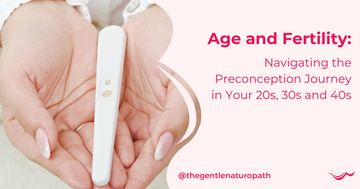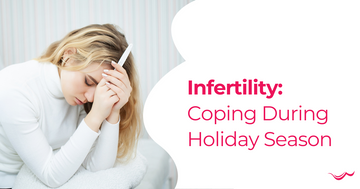Men’s Preconception Health Care in Australian General Practice
by Nikki Warren on May 02, 2022

Preconception care involves both partners improving their diet, changing unhealthy lifestyle behaviours. As well as taking nutritional supplements to help reduce the risk of birth defects and optimise the health of their baby.
The first health care professional a couple usually consults with is their general practitioner. However, this research demonstrated that men rarely receive fertility or preconception health advice in general practice.
90% of Australian GP’s revealed they did not feel confident in their knowledge about modifiable factors that affect male fertility.
This statistic is concerning as we know that sperm will contribute to half of development of the baby. Therefore sperm health will have a significant role in the baby's health and genetics.
The great news is that there is so much men can do to optimise their sperm health. Sperm health will either positively or negatively contribute to pregnancy success. Men need to have access to the correct medical care and support for advice for their preconception care.
Men need support and structured dietary and lifestyle advice. Which can help to educate them on making healthy changes for their sperm health and fertility.
An important part of improving male fertility is our approach to fertility as a society and medical system. Male fertility and sperm health is often over-looked in a couple's fertility journey. The expectation of dietary and lifestyle changes is mostly placed on women to follow. This needs to change to improve couple's overall fertility as well as future generations health.
Something that we can all do is to increase our resources and support for men. Another thing we can all do is to speak with the men in our lives about male fertility.
Having more conversations around men's health and fertility will help in various ways. Such as bringing more awareness and discussion to the topic. This helps to normalise conversations on male fertility so they can feel more comfortable seeking medical care.
It may also make them feel comfortable to make dietary and lifestyle changes. Especially in social settings, for example - saying no to smoking or drinking alcohol/getting take away food at work. Supporting men to make changes for their health and taking it seriously is something we can all do more of.
These factors include smoking, obesity and advanced paternal age. Various barriers to conducting discussions with men about preconception health have been identified. Some of these included “lack of knowledge, the sensitivity of the subject and fertility being perceived as a female issue”.
GP’s stated that they wanted trustworthy factsheets and websites to refer patients to. In the meantime, evidence-based naturopaths, nutritionists and acupuncturists are of great assistance. Particularly who specialise in fertility are a trustworthy source of information for couples planning a family.
Ref: Hogg et al. (2019) Australian Journal of Primary Health 25(4) 353-358 https://doi.org/10.1071/PY19069



